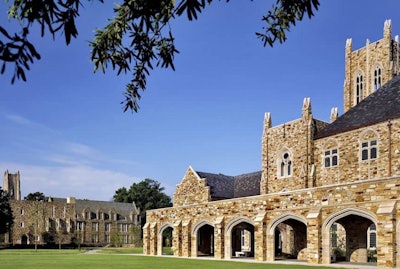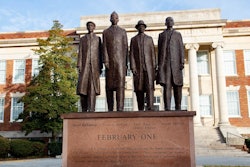Rhodes College will receive an $800,000 grant to expand their research on racial equity, discrimination, and justice in the Memphis and Mid-South region. Awarded by the Andrew Mellon Foundation, the nation’s largest supporter of the arts and humanities, the college has announced the creation of the Institute for Race and Social Transformation.
“We are grateful for support from the Mellon Foundation,” said Dr. Jennifer Collins, president of Rhodes Colleges. “Rhodes is a national liberal arts college where inclusive excellence and building a culture of belonging are central to our mission. We strive to empower students, faculty, staff, and community members to address contemporary social issues through intellectual inquiry, reflective dialogue, and community action." Rhodes College
Rhodes College
The three-year grant will provide funding for the research and documentation of Memphians stories who are often absent from the narratives about the city.
Dr. Natalie Person, dean for curricular development at Rhodes college, notes that Memphis is one of the most understudied regions in the United States. Many of the historical documentation that takes place in the city surrounds the lead up to-and the aftermath of the assassination of Dr. Martin Luther King Jr. in 1968.
“We have lived in that shadow for a long time and that was such a historical moment,” said Person. “It really shook the planet. But there are so many other stories around that time, before that time and since that time that need to be told. And we are a vibrant, culturally rich city with a very interesting history that the rest of the world doesn't know much about.”
The grant will provide funding for the expansion of faculty and students trained to do racial justice research and advocacy. College officials say that the grant will also help to elevate the success stories of incarcerated women participating in Rhodes’ Liberal Arts in Prison program.
Dr. Charles McKinney, the Neville Frierson Bryan Chair of Africana Studies and associate professor of history at Rhodes College, said that the grant will provide the opportunity to work on a rich level of research for the city of Memphis. It will also open pathways for community collaborations and city growth.
“You're creating an archive, you're creating information,” said McKinney. “That information can then be used by other scholars, other researchers who are thinking about Memphis, who are thinking about civil rights, who are thinking about community development or thinking about social moments. Who are thinking about all the things that you think about when you do research on a particular place.”
Memphis has one of the largest populations of African Americans in the United States. According to the US Census, the city's population is 64% Black.
For McKinney, archiving and understanding the history of a city can provide positive impacts to city development. He said that having increased levels of information about neighborhoods and communities within the city can establish a better picture of why and how long certainy challenges and inequalities are happening.
The grant will also provide support for an annual Race and Social Transformation Symposium and summer fellowships for Rhodes college and students attending Historically Black Colleges and Universities.
“We're just over the moon right now with the prospects of what doors this will open,” said Person. “Not just in terms of faculty scholarship and students honing their research skills, but also in strengthening some of the partnerships that we already have with local organizations who are committed to the same kind of work.”





















